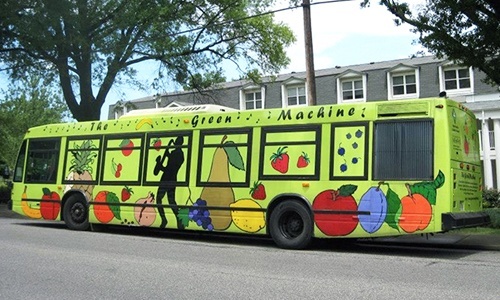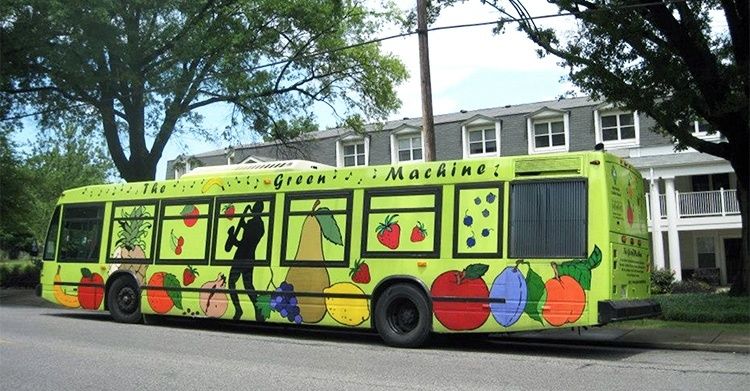

Around 15 percent of the world’s food is now grown in urban areas. According to the U.N. Food and Agriculture Organization (FAO), urban farms already supply food to about 700 million residents of cities, representing about a quarter of the world’s urban population. By 2030, 60 percent of people in developing countries will likely live in cities.

At Food Tank, we are amazed by the efforts of hundreds of urban farms and gardens to grow organic produce, cultivate food justice and equity in their communities and revitalize urban land. Urban agriculture not only contributes to food security, but also to environmental stewardship and a cultural reconnection with the land through education.
The Urban Food Policy Pact (UFPP), signed on World Food Day, addresses the potential of cities to contribute to food security through urban agriculture. A technical team of 10 members organized physical and virtual workshops with many of the 45 cities participating in the pact, and drafted a framework for action that includes 37 provisions covering the themes of governance, food supply and distribution, sustainable diets and nutrition, poverty alleviation, food production, and food and nutrient recovery.
“The 2015 Sustainable Development Goals (SDGs) recognize the importance of building sustainable cities,” says Maurizio Baruffi, Chief of Staff of the Mayor of Milan, Italy. “The City of Milan is partnering with urban areas around the world to embark on this journey, starting from food.”
Do you want to discover urban agriculture projects in your own city or are you interested in visiting farms during your travels to new urban areas? Check out these inspiring projects, and find even more links to urban agriculture projects below.
Abalimi is an urban agriculture and environmental action group located outside of Capetown, South Africa. The organization supports and assists groups and individuals looking to improve their livelihoods through organic farming.
Alternatives’ Feeding Citizenship
A nonprofit that promotes social and environmental justice in Montreal, Canada, Alternatives’ Feeding Citizenship is growing healthy food to fuel healthy communities. The project engages the community through horticultural training programs while supporting school and neighborhood gardens.
Baltimore Urban Gardening with Students (BUGS)
An after-school and summer program, BUGS provides children from low-income neighborhoods in Baltimore, Maryland with a safe place for learning. Kids can garden, visit local farms and try new foods while improving math and reading skills as well as exploring creative entrepreneurial projects.
Located in Puerto Maldonado, Peru, Camino Verde’s mission is to plant trees and encourage environmental stewardship through educational programs and public awareness. The project’s Living Seed Bank acts as a botanical garden with over 250 tree species and protects endangered varieties. Camino Verde has planted over 70 different fruit trees, 40 flowering species, and enough trees to cover seven hectares of land.
Serving communities in Canberra, Australia, Canberra City Farms is dedicated to establishing learning hubs where people can collaborate and share their knowledge of sustainable and environmentally responsible food production.
A 100 percent bike-powered compost recycling project in Austin, Texas, Compost Pedallers strives to reduce waste, strengthen the local food system and connect the community with farms. Residents can sign up to redirect organic waste to local farms and gardens through the bicycle-powered network.
Detroit Dirt is a compost company that helps complete the “circle of life” in food production by regenerating waste into resources. Through partnerships with community coffee houses and local businesses, the organization is hoping to instill a self-sustaining culture of recycling organic waste and provide a valuable resource to urban farms and gardens in Detroit.
A municipal organic farm nestled in an expansive park, Ferme de Paris provides the public with vegetable gardens, orchards, medicinal plant gardens and a number of farm animals housed in sustainably-constructed buildings. City residents can even stay to volunteer if they want to.
Fresh & Local is looking to use urban agriculture to improve the health and well-being of Mumbai. The organization takes underutilized spaces and transforms them into places of community empowered food production.
Frisch vom Dach (Fresh from the Roof)
An aquaponics project starting on the rooftop of a former malt factory in Berlin, Germany, Frisch vom Dach uses nutrients from aquaculture to irrigate plants in a mostly closed loop.
Green Machine Mobile Food Market
A collaborative project among a number of organizations in Memphis, Tennessee, the Green Machine Mobile Food Market uses a bus to deliver fresh fruits and vegetables to almost 400 customers in the food deserts of South Memphis.
Grignon Energie Positive, located in Paris, France, is an experimental farm run by the AgroParisTech program for sustainable development. The farm is working to reduce energy inputs by developing techniques that minimize its carbon footprint while growing enough organic food to feed between 5,500 and 8,000 people annually.
Grow City is a nonprofit in San Francisco, California that works to amend the way people consider the division between urban and rural to build a “more secure, sustainable, and fair” food system.
An edible forest in Mexico City, Mexico with 45 tree varieties, a seed bank, and a large section of bio-intensive gardening, Huerto Tlatelolco was created with the objective of building the local community.
A nonprofit farming cooperative in the South Bronx, New York, La Finca del Sur is led by Latina and black women. By empowering minority women through economic and food stability, the project is contributing to social and political equity in an underserved area.
The Last Organic Outpost is a research farm that teaches sustainable agriculture techniques to residents of Houston, Texas. The project targets underserved areas and supports local farmers so they can develop a safe, healthy local food economy.

 233k
233k  41k
41k  Subscribe
Subscribe 